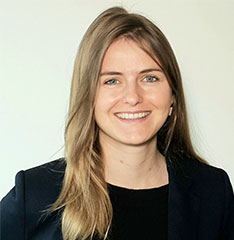
Professional Portrait with Carmen Moreno: Analyst – Credit Management Office
Find out about interesting facts relating to the job portrait of an "Analyst - Credit Management Office" with Carmen Moreno. Our former HSLU and Data Science student - multi-talented and always eager to try new things - spends and experiences her day-to-day work at Julius Baer. Read more about Carmen's interesting work life and challenges below.

Carmen Moreno
Analyst – Credit Management Office @Julius Baer
First of all, tell us something about yourself: Which hashtags describe you the best?
#experimenter #kitesurfer #explorer #reinventyourself
Tell us a bit more about them.
I love trying out new things: Whether it involves taking ceramic classes, learning calligraphy, skydiving, or kickboxing, I’m always looking for new feelings and experiences that help me grow. But you’re also likely to find me by the water, because whenever I can I go looking for some wind for my kite, or I go diving to explore a new underwater universe. I like different kinds of water sport. But I’m especially keen on kitesurfing and have been making steady progress. There are no prescribed limits: You define your boundaries and how strong you want to be in that domain. And for that I have travelled to a lot of exotic places. It’s hard to describe why the sea is so important to me. It just gives me a great feeling. I’m fortunate that I can also practice this sport on the various lakes in Switzerland, surrounded by the Alps.
Now let’s talk about your professional life: What do you do at Julius Baer?
I’m a member of the Credit Management Office & Controls team, which is responsible for internal controls of the global credit business. This means I’m involved in acquiring, processing and analyzing data and then communicating the results to senior management. This information then flows into various reports before it gets passed on to our teams and managers. Our analysis forms the basis of important decisions. On the other hand, the lending business at JB calls for a deep understanding of markets because of the special cases we handle. I’ve had the job for eight months now and still feel like a total newcomer! Luckily, I’m in a great team that’s very supportive.
What did you do before and why did you join Julius Baer?
I previously worked in the marketing department for a renowned brand in the food sector, where I was largely involved in project management. But I missed working more with numbers and making decisions based on data.
I am not yet a financial expert, but I found the bank to be very attractive because of its complexity and the global impact of its business. Here, having the right data is the key to making good decisions – especially when considering the business volume that JB handles. That’s why I find banking to be such an interesting sector. I didn’t expect to get such an exciting job, given my modest background in finance. But somehow it all worked out. I’m very grateful to my current boss who believed in me.
Tell us about the most exciting thing in your job.
There’s so much to learn, not only in the technical field but also in the lending business for very wealthy individuals and companies. The lending business is much more complex and interesting than I ever could have imagined. Analyzing the data involves so much, and you have to be very, very precise. Priorities can change quickly, so you need to be flexible and open to changes. But that’s exactly what makes it so exciting for me – especially when there’s a good team to support you.
Which data science skills are especially in demand in your job?
I think that automating reports and improving data quality are very important for us. In day-to-day business, SQL skills, IT skills, VBA and sometimes Tableau are particularly in demand.
Do you think of yourself more as a techie or as an analyst? Or as a creative genius, management superhero or generalist wizard?
I think I fall somewhere in between an analysis geek and a management superhero. I enjoy analyzing data and information. But I also need a change once in a while. So, managing small projects provides some variety and lets me exchange ideas with others. I need that to stay motivated.
What do you remember the most when you look back at your time in the MSc in Applied Information and Data Science program?
First of all, I want to mention that the lecturers were hugely enthusiastic and truly passionate about the various fields of data science, which was really contagious. I probably enjoyed working on group and individual projects the most; in other words, I liked anything that involved practical work. The lecturers gave us a lot of freedom in choosing the topics and tools, so I had the opportunity to develop in the direction that interests me. That’s important because the professional field of data science is huge. My studies also sparked a fascination for data visualization, and I tried to use visualization techniques and tools whenever I could.
What are the biggest challenges in your job at the moment?
My biggest challenge at the moment is to broaden my knowledge of finance and credit management, which is where I’m weaker right now in relation to my technical skills. So that’s what I’ll probably be focusing on the most over the next 8 to 12 months. But it’s an exciting field, and my team motivates and helps me a lot, so I’m enthusiastic about tackling this challenge. In time, when I have more experience and confidence, I’ll probably take on more complex process digitization projects and work with digital transformation in general.
What advice would you have for others starting in the same job?
First of all: If you want to apply fancy ML or DL methods, this is not the job for you. The position is more geared to data analysts. I discussed this with colleagues and believe that there is a shared awareness, at least in the financial sector, that we need digitalizing processes in general and have to further develop our data analysis capabilities. In some cases, you can actually use ML to improve data quality, build risk models and identify potentially fraudulent transaction analysis tools. But even in these cases, using ML is only a small part of the fields of activity. Proper stakeholder management, communication skills, project management as well as data sourcing, cleansing, engineering, etc. make up the lion’s share of the work.
If you want to work in this field, you need to be inquisitive, open-minded and perhaps a little brave to get involved in an area that was previously foreign to you. But if you’re passionate about your work and like what you do, you’ll be OK no matter what! The business environment needs data innovators, but be prepared to challenge yourself and stick with what you’re doing.
And finally: What new hashtag are you aiming for in 2021?
I would like to further develop my data visualization skills, which means I’ll probably aim for a certification in Tableau or Power BI, or both. I’ll try to do it in my current position, but if that’s not possible, I may volunteer for projects with a non-profit organization.
Many thanks to Carmen Moreno for this informative interview and the interesting insights into your job!
Contact us if you have any questions about the degree programme or for individual advice:
Tel.: +41 41 228 42 53 / E-mail: master.ids@hslu.ch
Start your career with the MSc in Applied Information and Data Science now!
Register and join us for a free online Info-Event:
Monday, 9 March 2026 (Online, English)
Monday, 13 April 2026 (Online, German)
Monday, 11 May 2026 (Online, English)
Monday, 8 June 2026 (Online, German)
MORE INFORMATION TO THE MASTER’S PROGRAMME HERE:
MORE FIELD REPORTS & EXPERIENCES: Professional portraits & study insights
PROGRAMME INFO: MSc in Applied Information and Data Science
DOWNLOAD BROCHURE: MSc in Applied Information and Data Science Brochure
CHECK OUT OUR: Generalist profile
FREQUENTLY ASKED QUESTIONS: FAQ
Contact us if you have any questions about the degree programme or for individual advice:
Tel.: +41 41 228 42 53 / E-mail: master.ids@hslu.ch






